Employment Law Case: BEF Company and Abdul's Employment Standards
VerifiedAdded on 2023/06/08
|6
|1366
|453
Report
AI Summary
This report analyzes an employment law case involving Abdul, an employee of BEF Company, and his employment contract. The case examines several issues, including overtime pay, unpaid public holidays, wrongful salary deductions, and lack of termination pay. The analysis focuses on the Employment Standards Act 2000, highlighting sections related to overtime, minimum wage, vacation pay, and termination pay. The report argues that the employer failed to comply with the Act, depriving Abdul of his rightful compensation and benefits. Abdul is advised to sue the company for non-compliance with the rules and for the unjustifiable deprivation of his payment. The report references several legal articles and cases to support its arguments.
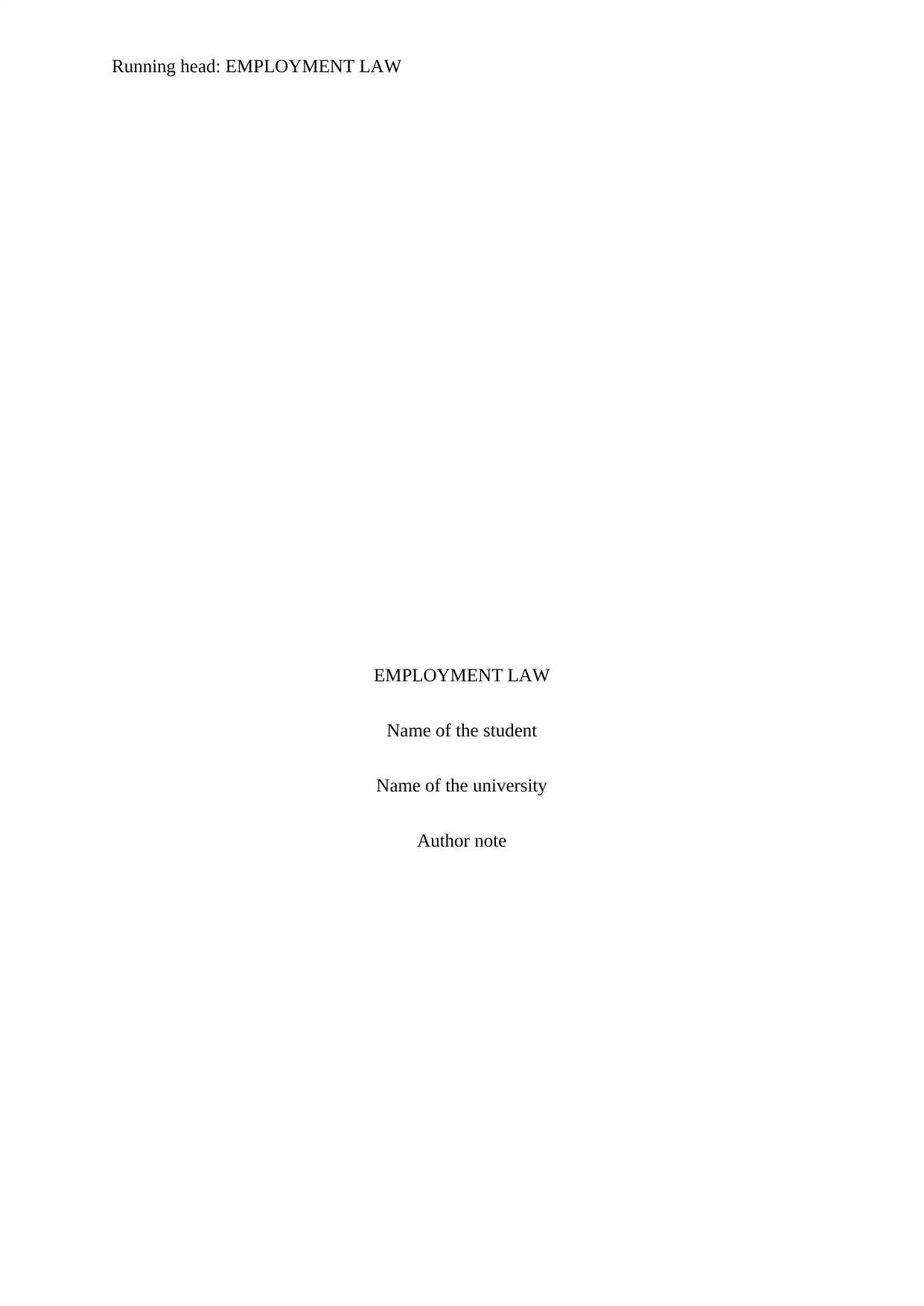
Running head: EMPLOYMENT LAW
EMPLOYMENT LAW
Name of the student
Name of the university
Author note
EMPLOYMENT LAW
Name of the student
Name of the university
Author note
Paraphrase This Document
Need a fresh take? Get an instant paraphrase of this document with our AI Paraphraser
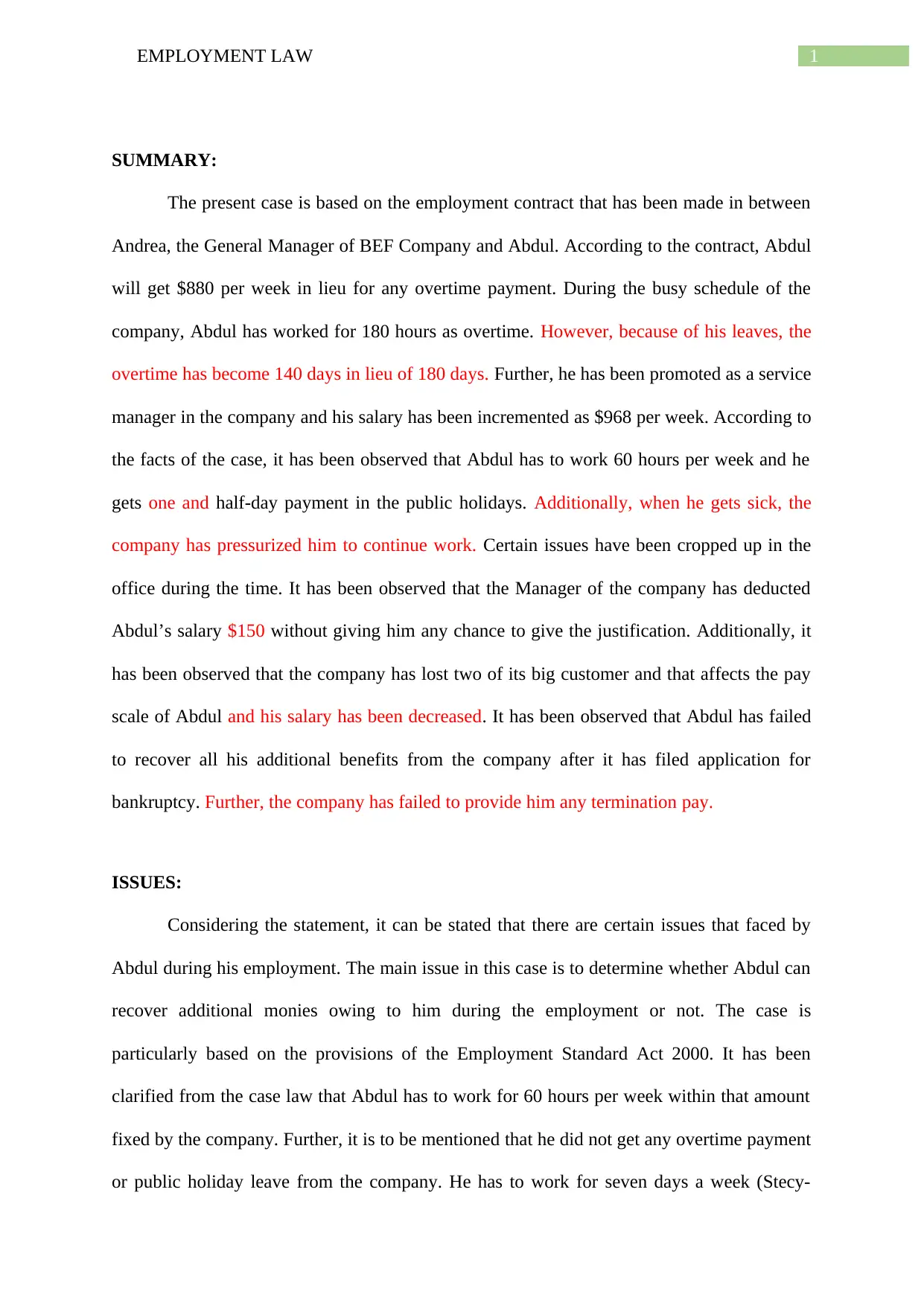
1EMPLOYMENT LAW
SUMMARY:
The present case is based on the employment contract that has been made in between
Andrea, the General Manager of BEF Company and Abdul. According to the contract, Abdul
will get $880 per week in lieu for any overtime payment. During the busy schedule of the
company, Abdul has worked for 180 hours as overtime. However, because of his leaves, the
overtime has become 140 days in lieu of 180 days. Further, he has been promoted as a service
manager in the company and his salary has been incremented as $968 per week. According to
the facts of the case, it has been observed that Abdul has to work 60 hours per week and he
gets one and half-day payment in the public holidays. Additionally, when he gets sick, the
company has pressurized him to continue work. Certain issues have been cropped up in the
office during the time. It has been observed that the Manager of the company has deducted
Abdul’s salary $150 without giving him any chance to give the justification. Additionally, it
has been observed that the company has lost two of its big customer and that affects the pay
scale of Abdul and his salary has been decreased. It has been observed that Abdul has failed
to recover all his additional benefits from the company after it has filed application for
bankruptcy. Further, the company has failed to provide him any termination pay.
ISSUES:
Considering the statement, it can be stated that there are certain issues that faced by
Abdul during his employment. The main issue in this case is to determine whether Abdul can
recover additional monies owing to him during the employment or not. The case is
particularly based on the provisions of the Employment Standard Act 2000. It has been
clarified from the case law that Abdul has to work for 60 hours per week within that amount
fixed by the company. Further, it is to be mentioned that he did not get any overtime payment
or public holiday leave from the company. He has to work for seven days a week (Stecy-
SUMMARY:
The present case is based on the employment contract that has been made in between
Andrea, the General Manager of BEF Company and Abdul. According to the contract, Abdul
will get $880 per week in lieu for any overtime payment. During the busy schedule of the
company, Abdul has worked for 180 hours as overtime. However, because of his leaves, the
overtime has become 140 days in lieu of 180 days. Further, he has been promoted as a service
manager in the company and his salary has been incremented as $968 per week. According to
the facts of the case, it has been observed that Abdul has to work 60 hours per week and he
gets one and half-day payment in the public holidays. Additionally, when he gets sick, the
company has pressurized him to continue work. Certain issues have been cropped up in the
office during the time. It has been observed that the Manager of the company has deducted
Abdul’s salary $150 without giving him any chance to give the justification. Additionally, it
has been observed that the company has lost two of its big customer and that affects the pay
scale of Abdul and his salary has been decreased. It has been observed that Abdul has failed
to recover all his additional benefits from the company after it has filed application for
bankruptcy. Further, the company has failed to provide him any termination pay.
ISSUES:
Considering the statement, it can be stated that there are certain issues that faced by
Abdul during his employment. The main issue in this case is to determine whether Abdul can
recover additional monies owing to him during the employment or not. The case is
particularly based on the provisions of the Employment Standard Act 2000. It has been
clarified from the case law that Abdul has to work for 60 hours per week within that amount
fixed by the company. Further, it is to be mentioned that he did not get any overtime payment
or public holiday leave from the company. He has to work for seven days a week (Stecy-
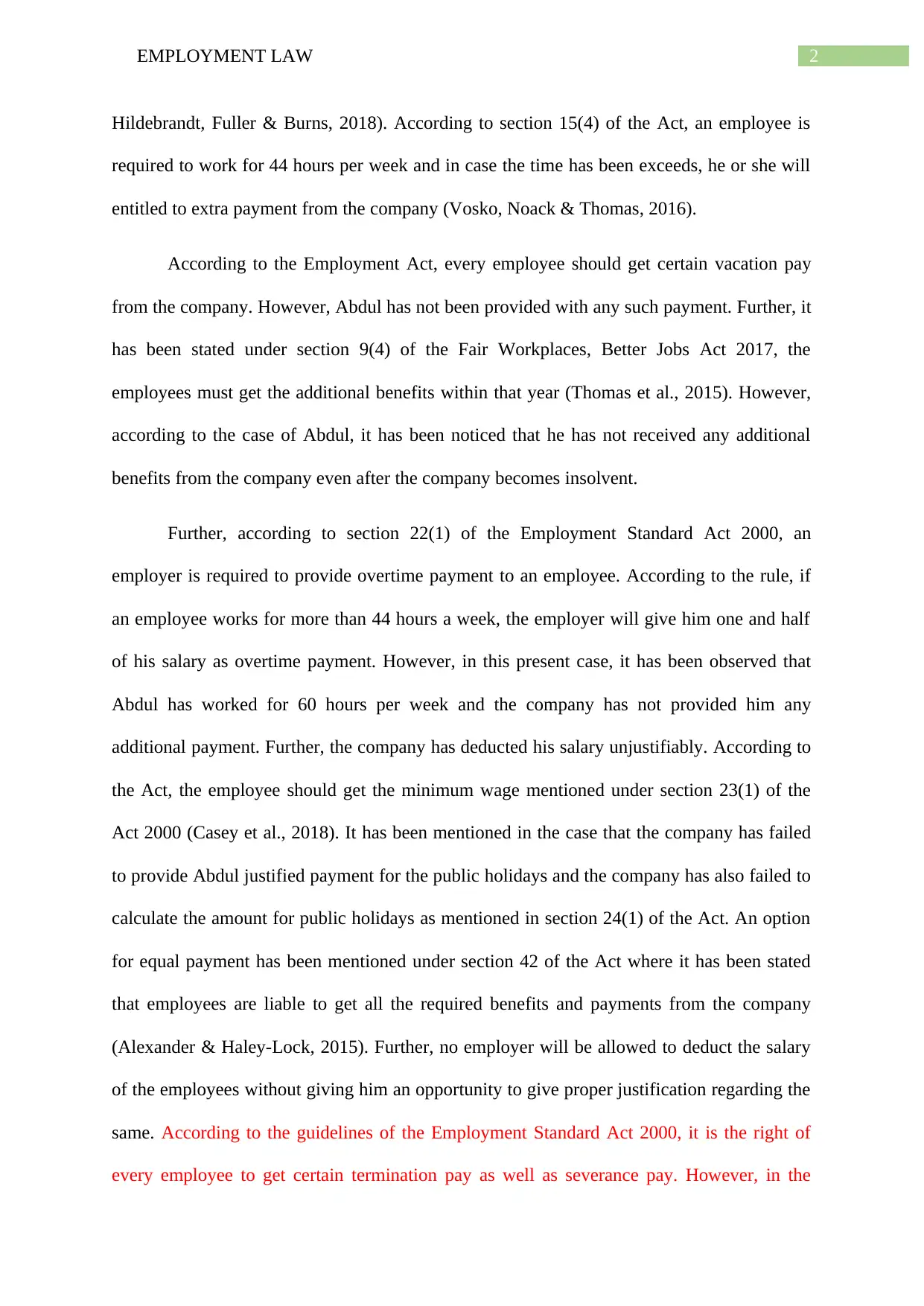
2EMPLOYMENT LAW
Hildebrandt, Fuller & Burns, 2018). According to section 15(4) of the Act, an employee is
required to work for 44 hours per week and in case the time has been exceeds, he or she will
entitled to extra payment from the company (Vosko, Noack & Thomas, 2016).
According to the Employment Act, every employee should get certain vacation pay
from the company. However, Abdul has not been provided with any such payment. Further, it
has been stated under section 9(4) of the Fair Workplaces, Better Jobs Act 2017, the
employees must get the additional benefits within that year (Thomas et al., 2015). However,
according to the case of Abdul, it has been noticed that he has not received any additional
benefits from the company even after the company becomes insolvent.
Further, according to section 22(1) of the Employment Standard Act 2000, an
employer is required to provide overtime payment to an employee. According to the rule, if
an employee works for more than 44 hours a week, the employer will give him one and half
of his salary as overtime payment. However, in this present case, it has been observed that
Abdul has worked for 60 hours per week and the company has not provided him any
additional payment. Further, the company has deducted his salary unjustifiably. According to
the Act, the employee should get the minimum wage mentioned under section 23(1) of the
Act 2000 (Casey et al., 2018). It has been mentioned in the case that the company has failed
to provide Abdul justified payment for the public holidays and the company has also failed to
calculate the amount for public holidays as mentioned in section 24(1) of the Act. An option
for equal payment has been mentioned under section 42 of the Act where it has been stated
that employees are liable to get all the required benefits and payments from the company
(Alexander & Haley‐Lock, 2015). Further, no employer will be allowed to deduct the salary
of the employees without giving him an opportunity to give proper justification regarding the
same. According to the guidelines of the Employment Standard Act 2000, it is the right of
every employee to get certain termination pay as well as severance pay. However, in the
Hildebrandt, Fuller & Burns, 2018). According to section 15(4) of the Act, an employee is
required to work for 44 hours per week and in case the time has been exceeds, he or she will
entitled to extra payment from the company (Vosko, Noack & Thomas, 2016).
According to the Employment Act, every employee should get certain vacation pay
from the company. However, Abdul has not been provided with any such payment. Further, it
has been stated under section 9(4) of the Fair Workplaces, Better Jobs Act 2017, the
employees must get the additional benefits within that year (Thomas et al., 2015). However,
according to the case of Abdul, it has been noticed that he has not received any additional
benefits from the company even after the company becomes insolvent.
Further, according to section 22(1) of the Employment Standard Act 2000, an
employer is required to provide overtime payment to an employee. According to the rule, if
an employee works for more than 44 hours a week, the employer will give him one and half
of his salary as overtime payment. However, in this present case, it has been observed that
Abdul has worked for 60 hours per week and the company has not provided him any
additional payment. Further, the company has deducted his salary unjustifiably. According to
the Act, the employee should get the minimum wage mentioned under section 23(1) of the
Act 2000 (Casey et al., 2018). It has been mentioned in the case that the company has failed
to provide Abdul justified payment for the public holidays and the company has also failed to
calculate the amount for public holidays as mentioned in section 24(1) of the Act. An option
for equal payment has been mentioned under section 42 of the Act where it has been stated
that employees are liable to get all the required benefits and payments from the company
(Alexander & Haley‐Lock, 2015). Further, no employer will be allowed to deduct the salary
of the employees without giving him an opportunity to give proper justification regarding the
same. According to the guidelines of the Employment Standard Act 2000, it is the right of
every employee to get certain termination pay as well as severance pay. However, in the
⊘ This is a preview!⊘
Do you want full access?
Subscribe today to unlock all pages.

Trusted by 1+ million students worldwide
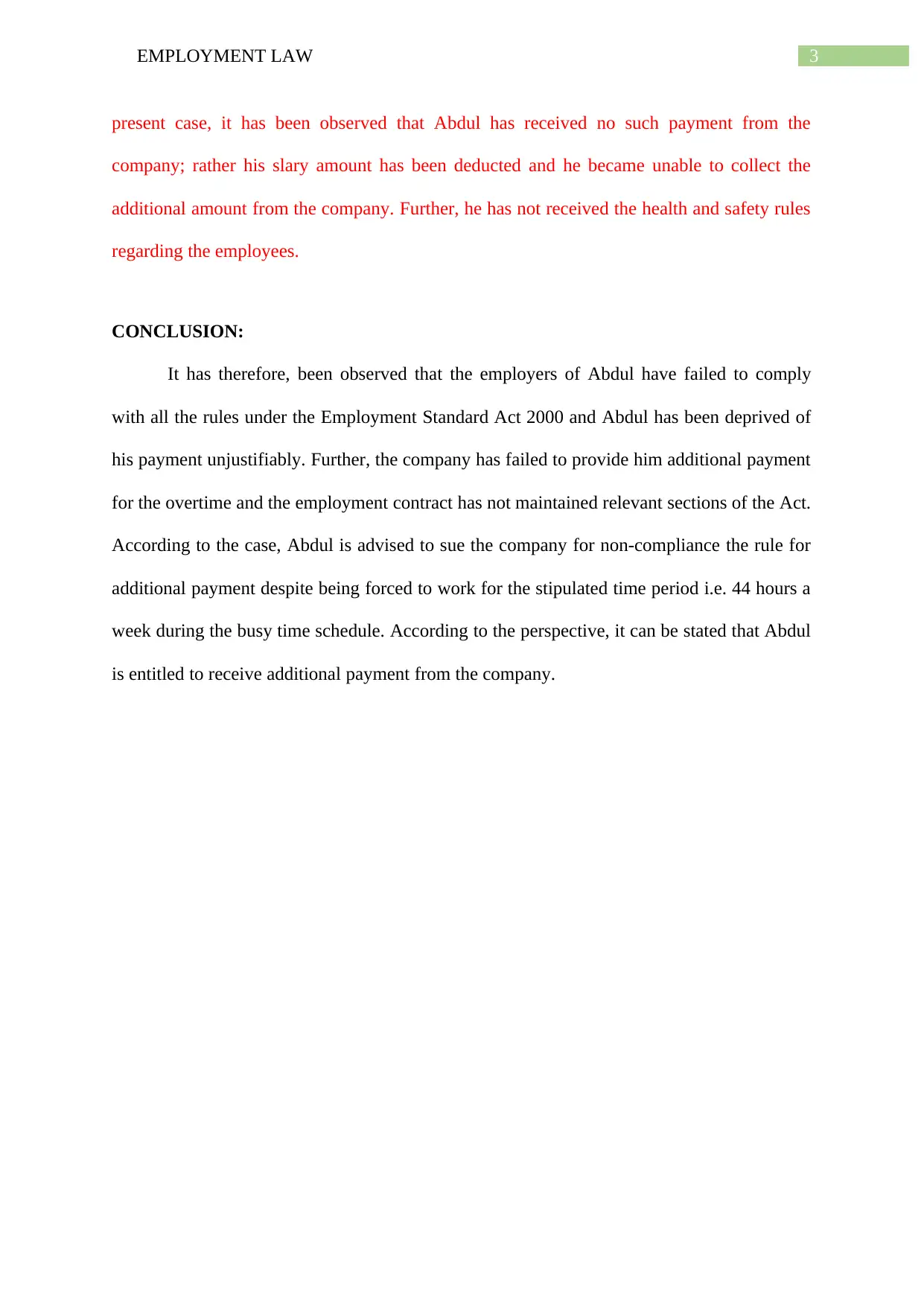
3EMPLOYMENT LAW
present case, it has been observed that Abdul has received no such payment from the
company; rather his slary amount has been deducted and he became unable to collect the
additional amount from the company. Further, he has not received the health and safety rules
regarding the employees.
CONCLUSION:
It has therefore, been observed that the employers of Abdul have failed to comply
with all the rules under the Employment Standard Act 2000 and Abdul has been deprived of
his payment unjustifiably. Further, the company has failed to provide him additional payment
for the overtime and the employment contract has not maintained relevant sections of the Act.
According to the case, Abdul is advised to sue the company for non-compliance the rule for
additional payment despite being forced to work for the stipulated time period i.e. 44 hours a
week during the busy time schedule. According to the perspective, it can be stated that Abdul
is entitled to receive additional payment from the company.
present case, it has been observed that Abdul has received no such payment from the
company; rather his slary amount has been deducted and he became unable to collect the
additional amount from the company. Further, he has not received the health and safety rules
regarding the employees.
CONCLUSION:
It has therefore, been observed that the employers of Abdul have failed to comply
with all the rules under the Employment Standard Act 2000 and Abdul has been deprived of
his payment unjustifiably. Further, the company has failed to provide him additional payment
for the overtime and the employment contract has not maintained relevant sections of the Act.
According to the case, Abdul is advised to sue the company for non-compliance the rule for
additional payment despite being forced to work for the stipulated time period i.e. 44 hours a
week during the busy time schedule. According to the perspective, it can be stated that Abdul
is entitled to receive additional payment from the company.
Paraphrase This Document
Need a fresh take? Get an instant paraphrase of this document with our AI Paraphraser
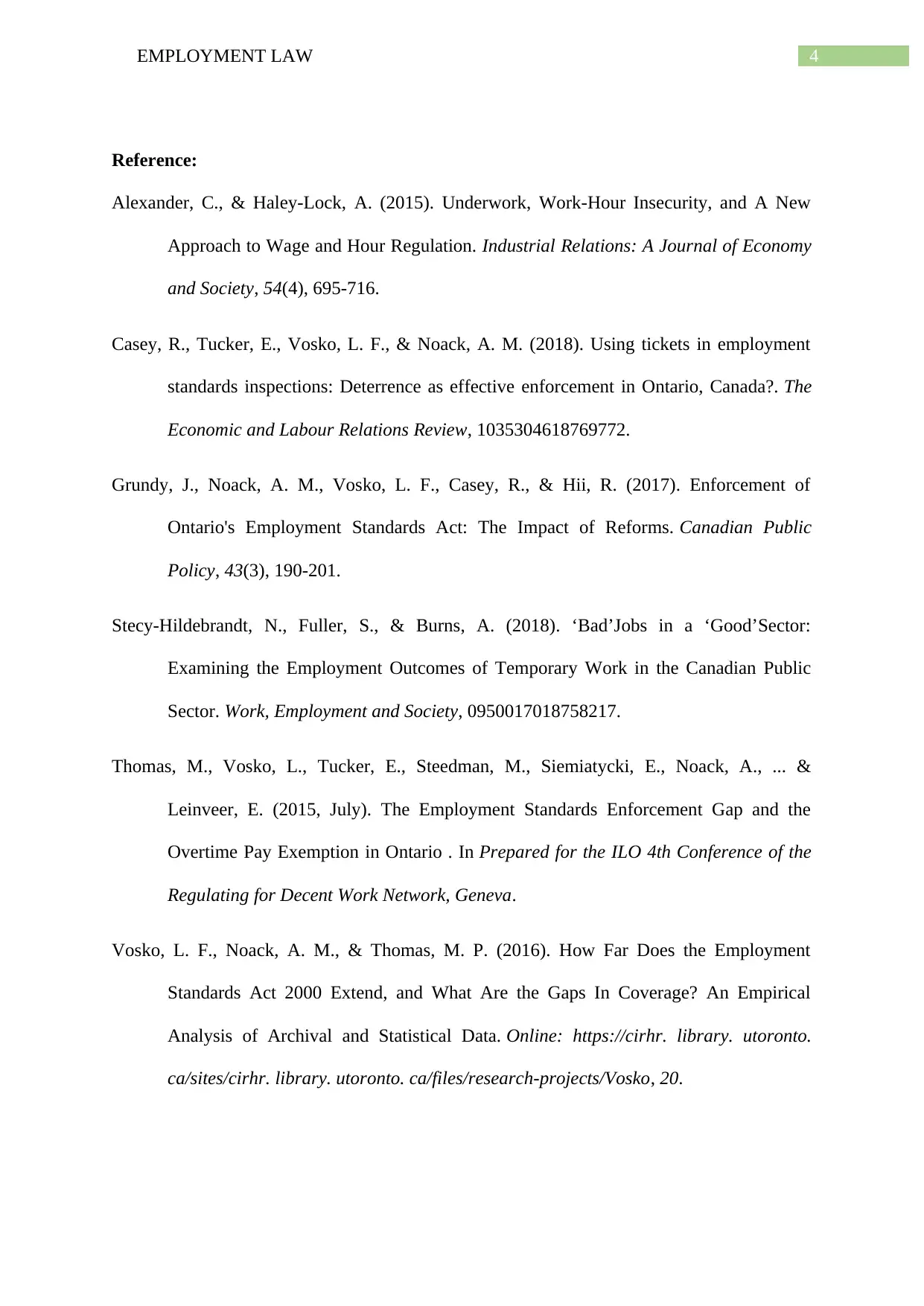
4EMPLOYMENT LAW
Reference:
Alexander, C., & Haley‐Lock, A. (2015). Underwork, Work‐Hour Insecurity, and A New
Approach to Wage and Hour Regulation. Industrial Relations: A Journal of Economy
and Society, 54(4), 695-716.
Casey, R., Tucker, E., Vosko, L. F., & Noack, A. M. (2018). Using tickets in employment
standards inspections: Deterrence as effective enforcement in Ontario, Canada?. The
Economic and Labour Relations Review, 1035304618769772.
Grundy, J., Noack, A. M., Vosko, L. F., Casey, R., & Hii, R. (2017). Enforcement of
Ontario's Employment Standards Act: The Impact of Reforms. Canadian Public
Policy, 43(3), 190-201.
Stecy-Hildebrandt, N., Fuller, S., & Burns, A. (2018). ‘Bad’Jobs in a ‘Good’Sector:
Examining the Employment Outcomes of Temporary Work in the Canadian Public
Sector. Work, Employment and Society, 0950017018758217.
Thomas, M., Vosko, L., Tucker, E., Steedman, M., Siemiatycki, E., Noack, A., ... &
Leinveer, E. (2015, July). The Employment Standards Enforcement Gap and the
Overtime Pay Exemption in Ontario . In Prepared for the ILO 4th Conference of the
Regulating for Decent Work Network, Geneva.
Vosko, L. F., Noack, A. M., & Thomas, M. P. (2016). How Far Does the Employment
Standards Act 2000 Extend, and What Are the Gaps In Coverage? An Empirical
Analysis of Archival and Statistical Data. Online: https://cirhr. library. utoronto.
ca/sites/cirhr. library. utoronto. ca/files/research-projects/Vosko, 20.
Reference:
Alexander, C., & Haley‐Lock, A. (2015). Underwork, Work‐Hour Insecurity, and A New
Approach to Wage and Hour Regulation. Industrial Relations: A Journal of Economy
and Society, 54(4), 695-716.
Casey, R., Tucker, E., Vosko, L. F., & Noack, A. M. (2018). Using tickets in employment
standards inspections: Deterrence as effective enforcement in Ontario, Canada?. The
Economic and Labour Relations Review, 1035304618769772.
Grundy, J., Noack, A. M., Vosko, L. F., Casey, R., & Hii, R. (2017). Enforcement of
Ontario's Employment Standards Act: The Impact of Reforms. Canadian Public
Policy, 43(3), 190-201.
Stecy-Hildebrandt, N., Fuller, S., & Burns, A. (2018). ‘Bad’Jobs in a ‘Good’Sector:
Examining the Employment Outcomes of Temporary Work in the Canadian Public
Sector. Work, Employment and Society, 0950017018758217.
Thomas, M., Vosko, L., Tucker, E., Steedman, M., Siemiatycki, E., Noack, A., ... &
Leinveer, E. (2015, July). The Employment Standards Enforcement Gap and the
Overtime Pay Exemption in Ontario . In Prepared for the ILO 4th Conference of the
Regulating for Decent Work Network, Geneva.
Vosko, L. F., Noack, A. M., & Thomas, M. P. (2016). How Far Does the Employment
Standards Act 2000 Extend, and What Are the Gaps In Coverage? An Empirical
Analysis of Archival and Statistical Data. Online: https://cirhr. library. utoronto.
ca/sites/cirhr. library. utoronto. ca/files/research-projects/Vosko, 20.

5EMPLOYMENT LAW
⊘ This is a preview!⊘
Do you want full access?
Subscribe today to unlock all pages.

Trusted by 1+ million students worldwide
1 out of 6
Related Documents
Your All-in-One AI-Powered Toolkit for Academic Success.
+13062052269
info@desklib.com
Available 24*7 on WhatsApp / Email
![[object Object]](/_next/static/media/star-bottom.7253800d.svg)
Unlock your academic potential
Copyright © 2020–2026 A2Z Services. All Rights Reserved. Developed and managed by ZUCOL.





